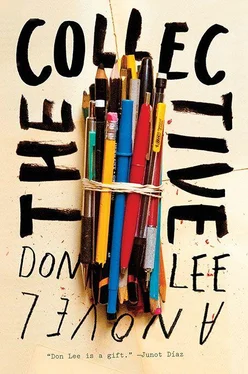I keep returning to the last conversation I had with him in Sudbury. He was down, but no more than usual in recent years, given more to brooding and self-denigration than braggadocio. Was there something I had missed — a sign? Something meaningful in the way he had said goodbye? Did he know then that it’d be the last time we would see each other?
I ask myself what I could have done differently. If I could have prevented it. If I could have saved him. In hindsight, I think everything — his entire life — had been coalescing toward that moment on the road. He had trapped himself. He had had no other option. He had wanted too much. You see, the problem was, he had been the idealist, not me.
All this I am projecting, of course. I’ll never know for sure. We can’t fully understand what plagues each other’s hearts, much less our own at times. Ultimately even our best friends are unknowable to us.
And it could be, I will allow, that I am trying to acquit myself of responsibility. Jessica implied as much when I called to tell her about the accident. I was inveighing against Joshua, his selfishness, his reckless, last-second deviation into the car’s path instead of gassing himself in his cottage — why couldn’t he have waited? — and she said, “Oh, Eric. You’ve always been so hard on him.”
“Shouldn’t that be flipped around?”
“No,” Jessica said. “You keep using the word pathetic.”
“Never to him.”
“Don’t you think he knew?” she asked. “He was always trying, so desperately, to live up to your expectations. It was agonizing for him. Can’t you see that?”
I couldn’t, and I still can’t — not really. As the years went by, I saw less and less of Joshua, especially after Didi reentered my life. Yet, all that time, maybe even long before then, while I thought Joshua was passing judgment on the choices I was making, had he felt the opposite, forever afraid I might disavow him? Did he believe I was deserting him after years of weathering my scorn — blaming him for things in which I had been, through my actions and inactions, just as culpable?
It’s been three years now. I sit in my kitchen and watch the kids outside, climbing the old mockernut hickory tree in the backyard. Didi’s nearby, cheering them on, vigilant. There’s a pot of kalbi jjim — braised short ribs, my mother’s recipe, Matteo’s favorite — simmering on the stove.
I look at the refrigerator door, festooned with the kids’ drawings and paintings, photos of them with goofy captions. Hanging from the patio trellis, canopied by wisteria, is a bird’s nest that Wyatt made this morning, ingeniously constructed — in minutes — with paper towels, disposable Styrofoam trays, yarn, and buttons. Even now, I know he will be an engineer. Or an artist.
It’s warm today, the sliding glass door open to the wavy heat of summer and the sounds of their laughter. It’s never quiet in this house, someone always around, which I don’t mind — which I’ve come to prefer, actually. I gaze at Wyatt’s bird’s nest rotating in the breeze, starting to wheel a little tumultuously, and I picture Joshua spinning through the air, the car rolling and tumbling, and I finally arrive at what Joshua might have been contemplating on Waterborne, why he had stepped into the car’s path, what he had been hoping would happen: the driver skidding to a stop after hitting him, opening the car door, and running back to where Joshua lay on the road, kneeling down beside him and saying it would be all right, an ambulance was on its way, and maybe squeezing his hand a little, a complete stranger, yet the only person Joshua could turn to, the only person he thought available, who could provide him with, in his last few seconds, a small measure of intimacy, ensuring he wouldn’t die alone.
Not long after the accident, I received an envelope. It was addressed to me in Huron Village in Joshua’s familiar chicken-scratch scrawl. He had misspelled the street name and put down the wrong zip code, transposing the first and second numbers, so the envelope first went to Calverton, Virginia, then was rerouted to Cambridge, then had to be forwarded to me in North Carolina. The original postmark was the Saturday of his death. I let the envelope sit on my desk all afternoon, overcome by what I might find inside. At last, I opened it. All it contained was a utility bill and a check.
I could imagine an accounts receivable clerk at NStar opening the envelope that Joshua must have mailed on the same morning, the clerk unfolding the letter that was within, looking curiously at it for a second, not exactly surprised, since this sort of thing happened practically every day, before tossing it into the recycle bin — whatever it was that Joshua had meant to tell me.
This novel would not have been possible without a residency provided by the Lannan Foundation. Thanks to Jo Chapman, Martha Jessup, Douglas Humble, Ray Freese, and, of course, Patrick Lannan, and to all the townspeople of Marfa, Texas, in particular Tim Johnson and Caitlin Murray.
For their editorial insights and support, I would like to thank my editor, Alane Salierno Mason; my agent, Maria Massie; and my friends Jennifer Egan and Fred Leebron.
I’m also indebted to Hans Evers, Katherine Bell, Kathy Herold, Ben Lerner, Paul Yoon, Richard Haesler, Maryanne O’Hara, Ruth Ernst, Om Paramapoonya, Elliott Holt, Meghan O’Rourke, Alan Vana, David Opdyke, Leland Cheung, Don Smith, Katie Mitchell, and the Corporation of Yaddo for their assistance.
Thanks, too, to Denise Scarfi, Dave Cole, Don Rifkin, and Alice Rha at W. W. Norton.












